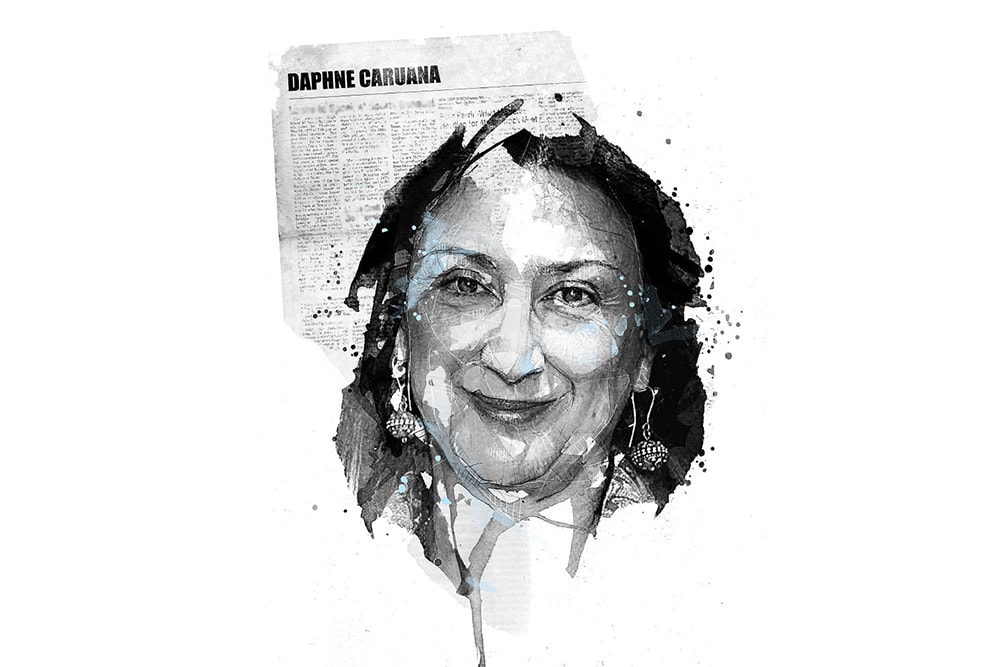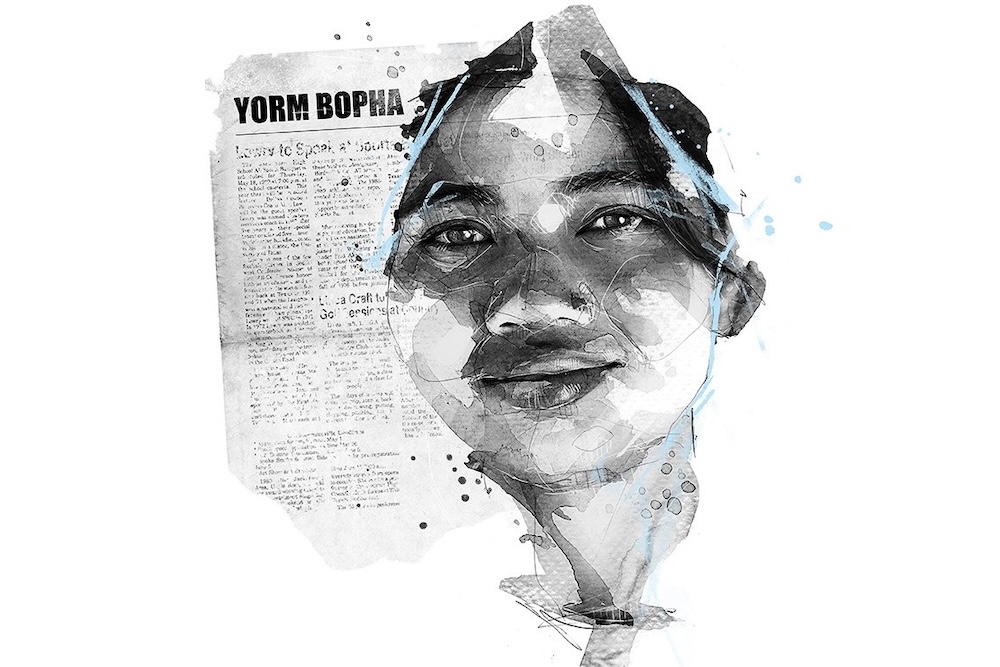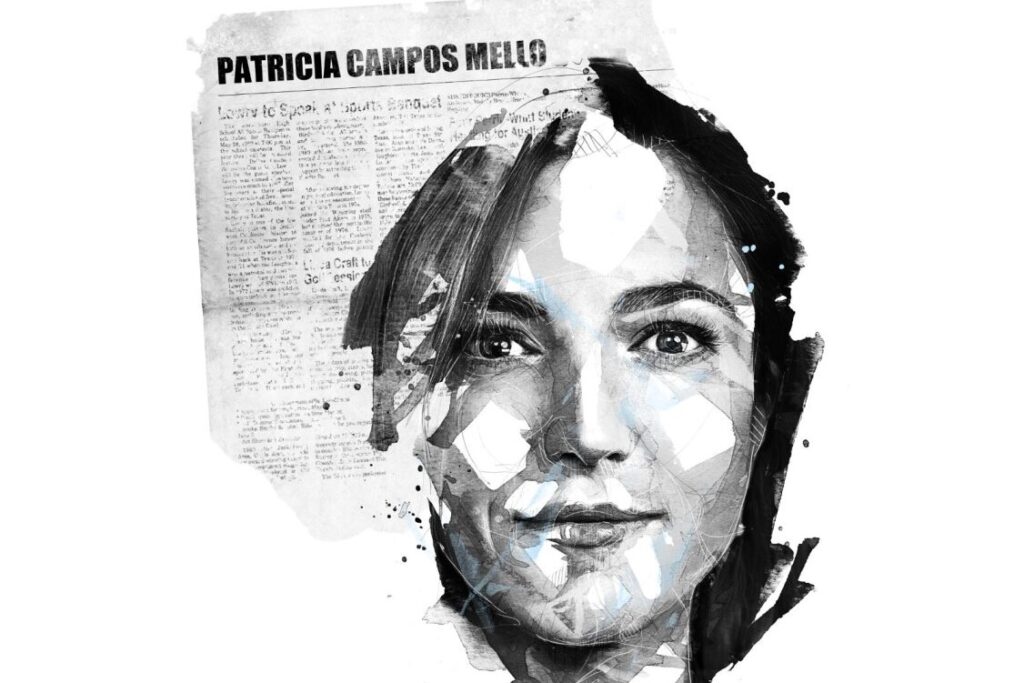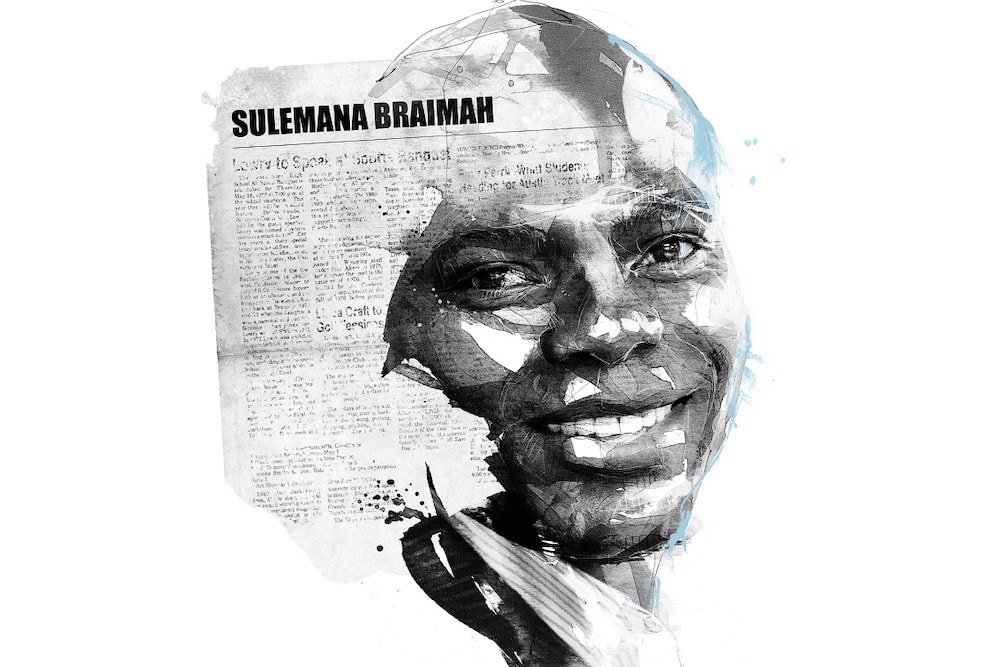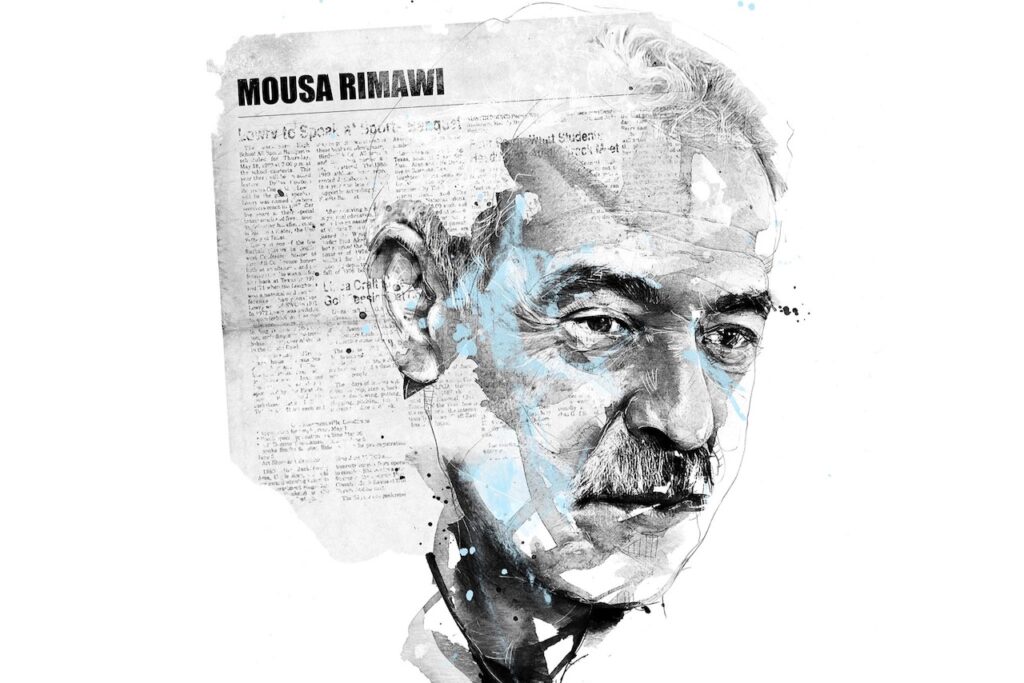Passionate, probing, and fearless, investigative journalist Daphne Caruana Galizia was a caustic critic of the powerful and paid the ultimate price for exposing corruption in Malta.
"There are crooks everywhere you look now. The situation is desperate."
At 53, Daphne Caruana Galizia was one of Malta’s best known journalists. Her most high-profile work exposed the political and financial corruption that she saw everywhere in Malta; for this she was adored by her readers and loathed by the corrupt.
On the afternoon of 16 October 2017, Caruana Galizia was killed by a car bomb. She had been driving a rental car near her home in Bidnija when an explosive device under her vehicle was detonated. The explosion was so powerful that pieces of the car were found scattered across multiple fields; Caruana Galizia’s remains were found by her son Matthew, 80 metres from the scene of the blast. His mother was the fourth person in Malta to be killed by a car bomb since the start of 2016.
Caruana Galizia had been a journalist for 30 years. She began her career in 1987, working as a news reporter for The Sunday Times of Malta. In 1992, she became an associate editor of The Malta Independent to which she contributed columns until her death. However, Caruana Galizia was best known for her blog – Running Commentary – which she founded in 2008, and which mixed investigative reporting and no-punches-pulled comment.
Many of the most powerful people in Malta sweated under the glare of Caruana Galizia’s spotlight as she examined their past and present records and – at times – their corruption; and when she believed that someone was corrupt, her criticism was caustic. Her targets included the Prime Minister of Malta, the leader of the opposition, and various other members of the major political parties. As a result, her blog became one of the most popular websites in Malta: it regularly attracted over 400,000 views a day – more than the combined circulation of the country’s newspapers.
Her work made her a lot of enemies. She was the victim of repeated death threats and was a regular defendant in defamation lawsuits. At the time of her death, she had 42 defamation and libel cases outstanding against her; many of these were filed by high ranking politicians.
In February 2017, Caruana Galizia spoke to the International Press Institute about the abuse of libel laws by Malta’s powerful: “The criminal defamation laws have to be repealed,” she said. “You simply cannot have politicians using the police to prosecute the journalists who write about them. The law, which was meant to protect the innocent from slander, is ripe for abuse by the powerful against those who oppose them.”
Concerns have often been raised about financial and political corruption in Malta. Its two main political parties – the Nationalists and Labour – have close ties to the island’s most powerful families, and the lines between politics, business, and the judiciary are sometimes blurred. Add to this an economy heavily dependent on financial services, the tax avoidance industry and online gambling, and you have huge potential for corruption. As Caruana Galizia wrote in her last blog post before she died: “There are crooks everywhere you look now. The situation is desperate.”
Much of her work during the final two years of her life focused on the revelations of suspicious financial activities provided by the infamous Panama Papers (11.5 million leaked documents detailing offshore tax avoiding entities); she broke the news that the Prime Minister’s Chief of Staff was the owner of secret offshore companies, and wrote that the Prime Minister’s wife received US$1million (paid into an offshore company) by the President of Azerbaijan’s daughter.
Her killing provoked national and international outrage. The European Commission, NGOs and media outlets made public statements calling for a thorough, independent investigation. Thousands of people flooded onto the streets of Malta’s capital, Valleta, calling for justice for Caruana Galizia; they carried placards reading, “Journalists will not be reduced to silence” and “We are not afraid.”
Many saw a direct connection between Caruana Galizia’s work and her murder. These included her son, Matthew, who wrote on Facebook the day after her death:
“My mother was assassinated because she stood between the rule of law and those who sought to violate it, like many strong journalists. But she was also targeted because she was the only person doing so. This is what happens when the institutions of the state are incapacitated: the last person left standing is often a journalist. Which makes her the first person left dead… A culture of impunity has been allowed to flourish by the government in Malta.”
Similar concerns were aired a month later by MEPs who visited the island on a fact-finding mission. Speaking of their “serious concerns” about the rule of law in Malta, the MEPs noted “a high degree of unwillingness to investigate,” a “failure to prosecute corruption and money-laundering,” and a general impression of “incompetence” among high level police officials.
On 4 December 2017, Prime Minister Muscat announced that ten men had been arrested in connection with Caruana Galizia’s killing. A day later, three of these men (Vincent Muscat and the brothers George and Alfred Degiorgio) appeared in court. They were charged with murder, criminal use of explosives, involvement in organised crime, and criminal conspiracy. All three pleaded not guilty.
Daphne Caruana Galizia was commemorated by IFEX members on the International Day to End Impunity, 2017.
In April 2018, reporters, newspapers, and media organisations came together to launch the Daphne Project. The aim of this collaborative initiative is to carry forward the anti-corruption work that Caruana Galizia started. In June 2018, it was reported that the magistrate responsible for investigating the murder of Caruana Galizia would be removed from the case due to an unrequested promotion; press freedom organisations feared that this would delay progress in the investigation.
On the one-year anniversary of Caruana Galizia’s murder, IFEX members including PEN International, the Committee to Protect Journalists, Reporters Without Borders and the International Press Institute came together with other press freedom groups to send a delegation to Malta. After meeting with the Prime Minister and other high-ranking members of the government, the delegation concluded that the Maltese authorities were not living up to their obligation to protect freedom of expression and press freedom. Among the many recommendations that the delegation made to the government was that an independent public inquiry be held into the Caruana Galizia murder.
Malta’s human rights record was reviewed at the UN’s Universal Periodic Review (UPR) in November 2018. ARTICLE 19, PEN International, the International Press Institute, Reporters Without Borders, the European Centre for Press & Media Freedom and English PEN submitted a joint report in which, once again, Malta was urged to commit to holding a public inquiry into the murder. It was one of a number of press freedom recommendations explicitly not accepted by Malta during the review.
In February 2019, the Times of Malta reported that police had identified a further “three to five” suspects whom they believed were involved in the “commissioning stage” of Caruana Galizia’s murder. However, according to the report, the police were seeking “rock solid evidence” before making arrests.
On 26 June 2019, the Parliamentary Assembly of the Council of Europe (PACE) voted to adopt a report on Caruana Galizia’s murder which cited “systemic failings” in the rule of law in Malta and tied these to the much-criticised police investigation into the crime. Importantly, the report called for an independent public inquiry into the murder; Malta had resisted implementing such an inquiry but was given three months to set one up by PACE.
In July 2019, it was announced that the three suspects charged with murdering Caruana Galizia would be sent to trial.
On 12 September 2019, the Council of Europe’s Human Rights Commissioner, Dunja Mijatović, wrote to Malta’s Prime Minister calling for the withdrawal of the approximately 30 posthumous pending civil defamation suits against Caruana Galizia’s family. In her letter to the Prime Minister she said that such lawsuits placed unjustified psychological and financial pressure on the family and that they could be perceived as intimidation.
On 20 September 2019, just six days before the three month deadline set by PACE was due to expire, the Maltese government announced the launch of a public inquiry into Caruana Galizia’s murder. However, the journalist’s family – and others – were quick to raise their concerns about the impartiality of members appointed to the board of inquiry.
Late November 2019 saw dramatic developments in the murder investigation: businessman Yorgen Fenech was arrested and charged with complicity in Caruana Galizia’s murder; Prime Minister Muscat’s former Chief of Staff, Keith Schembri, resigned and was arrested and questioned by police in connection with the investigation; Fenech – who has links to Schembri – claimed that he had evidence proving that the former Chief of Staff was involved in the murder conspiracy (a letter by a middleman whom Muscat pardoned in return for his cooperation with the murder investigation alleged the same); Economy Minister Chris Cardona also resigned, as did tourism Minister Konrad Mizzi (who was later reinstated). All three government officials (and Muscat) had been subjects of Caruana Galizia’s investigative reporting and scathing commentary.
Amidst all these revelations and resignations, Muscat announced that he would step down as prime minister (to take effect in January 2020).
Reacting to November’s developments, Pieter Omtzigt, author of the PACE report on the murder of Caruana Galizia, declared that Muscat may be “implicated” in the case; David Kaye, UN Special Rapporteur on Freedom of Expression, and Agnes Callamard, UN Special Rapporteur on Extra-judicial Killings, called on Muscat to completely remove himself from the inquiry into Caruana Galizia’s killing because of his links to those implicated in the crime.
In early December 2019, the EU Parliament, deeply concerned by the events of November, sent a mission to Malta. After meeting with Prime Minister Muscat, MEP Sophie In’t Veld said she had not been reassured by what she had heard and that Muscat’s decision to “stay on longer than necessary is another error of judgement”.
By mid-December 2019, there were press reports that Muscat had a direct connection to the murder suspect Yorgen Fenech. Academics, MEPs, IFEX members and Pieter Omtzigt made public calls on the prime minister to step down immediately.
Also in mid December, the EU Parliament approved a resolution calling on the EU to open a formal rule-of-law dialogue with Malta because of concerns over the handling of the murder investigation.
December also saw the first hearing of the long-demanded public inquiry into the Caruana Galizia murder.
January 2020 saw Robert Abela replace Joseph Muscat as Prime Minister of Malta. It also saw the resignation of Minister for Gozo, Justyne Caruana, following revelations of the friendship between murder suspect Yorgen Fenech and her husband, former deputy police chief, Silvio Valletta. Valletta was previously the lead investigator into the Caruana Galizia murder but was taken off the case in mid-2018 due to a conflict of interest. In January, police announced that he was under investigation.
On 17 January 2020, Maltese Police Commissioner Lawrence Cutajar resigned, following criticism of his handling of the murder investigation.
On 23 February 2021, a court sentenced Vincent Muscat to 15 years in prison and ordered him to pay 42,000 EUR in court expenses after he pleaded guilty to involvement in Caruana Galizia’s assassination.
On 29 July 2021, the Public Inquiry into the assassination of Daphne Caruana Galizia published its conclusions, finding that “the State has to shoulder responsibility for the assassination because it created an atmosphere of impunity, generated from the highest levels in the heart of the administration of the Office of the Prime Minister and like an octopus spread to other entities like regulatory institutions and the police, leading to the collapse of the rule of law.” The Inquiry made several recommendations with regard to strengthening the rule of law and the safety of journalists.
On 14 October 2022, brothers Alfred and George Degiorgio pleaded guilty to murdering Caruana Galizia. They both received sentences of 40 years in prison and were ordered to pay a fine of €42,930 each for expenses, plus €50,000 in criminal proceeds.
On 16 October 2022, the fifth anniversary of Caruana Galizia’s murder, IFEX members and other free expression groups publicly denounced the Maltese government’s lack of implementation of the recommendations made by the landmark Public Inquiry.
In September 2023, press freedom groups called on the government to publish the report by the Committee of Experts on Media, the body set up by the government to advise it on implementing the recommendations of the Public Inquiry, and to consult widely on any legislation subsequently proposed.
Illustration by Florian Nicolle
